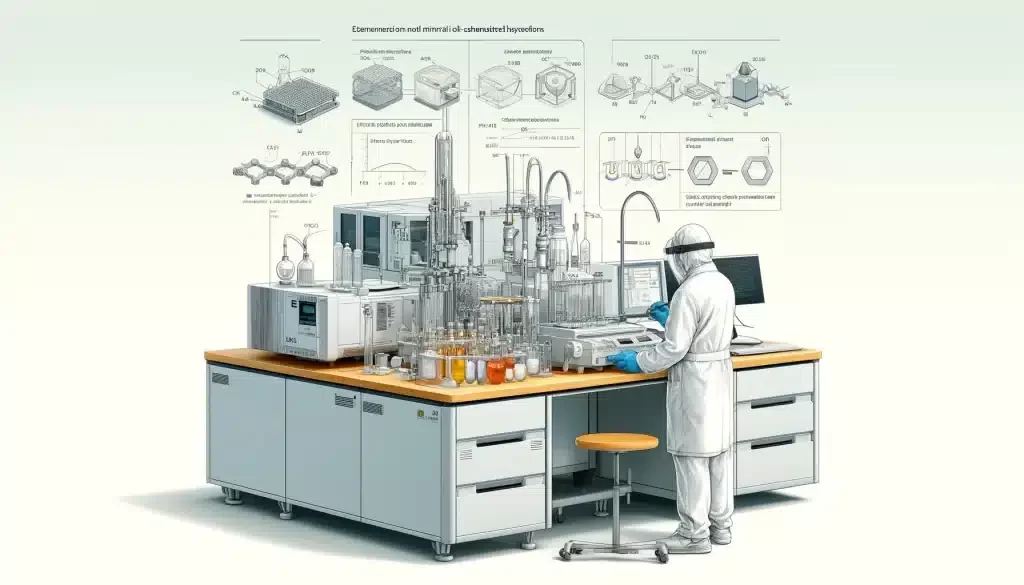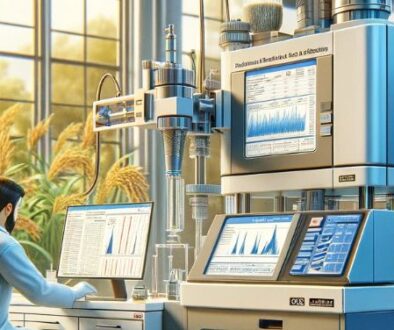Determination Of Saturated Hydrocarbon Mineral Oil In Rice And Rice By High Performance Liquid Chromatography-Gas Chromatography
high performance liquid chromatography-gas chromatography (HPLC-GC) method was established for the determination of mineral oil saturated hydrocarbons (MOSH) in rice and rice. First, n-hexane is used to extract MOSH from rice (or rice); rice contains a large amount of natural alkanes, which need to be purified with alumina. Then, the extract was concentrated and injected into HPLC for analysis. The target compound MOSH is accurately separated by heart-cutting technology and transferred to GC for measurement with a hydrogen flame ionization detector. Methodological investigation showed that liquid paraffin (MOSH¡¯s standard material) showed a good linear relationship in the range of 0.5 to 100 mg/L (correlation coefficient is 0.999), the method¡¯s quantitation limit is 0.05 mg/kg, and the recovery rate of standard addition is 89.1% to 91.4 % (relative standard deviation is 4.6% ~ 5.5%). This method was used to determine MOSH in 24 paddy and rice samples, and the content was 0.30 to 2.30 mg/kg.
Introduction to HPLC-GC Method for MOSH Detection in Rice
The development of precise and reliable analytical methods for the detection of contaminants in food products is a cornerstone in ensuring public health and safety. In this context, the study on the establishment of a high performance liquid chromatography-gas chromatography (HPLC-GC) method for the determination of mineral oil saturated hydrocarbons (MOSH) in rice is of paramount importance. The presence of MOSH in food items is a matter of concern due to its potential health risks, thus necessitating accurate and efficient detection techniques.
Extraction and Purification of MOSH from Rice
This innovative method commences with the extraction of MOSH from rice using n-hexane. Rice, being a staple food for a large portion of the global population, contains a significant amount of natural alkanes which necessitate purification for accurate analysis. This purification is adeptly achieved using alumina, ensuring the removal of interfering substances and enhancing the specificity of the MOSH detection.
HPLC Analysis and Heart-Cutting Technology for MOSH Separation
Following the extraction and purification process, the concentrated extract is subjected to HPLC analysis. The core of this method lies in its use of heart-cutting technology, which allows for the accurate separation of the target compound, MOSH. This separation is crucial for the elimination of co-eluting substances that could potentially interfere with the analysis, thereby improving the accuracy and reliability of the method.
GC Quantification with Hydrogen Flame Ionization Detector
Subsequently, the separated MOSH is transferred to a gas chromatography (GC) system equipped with a hydrogen flame ionization detector for quantification. This step is critical for the sensitive and specific detection of MOSH levels within the rice samples. The methodological investigation of this approach revealed a robust linear relationship for liquid paraffin (used as the standard material for MOSH) within the concentration range of 0.5 to 100 mg/L, demonstrating a high correlation coefficient of 0.999. Such a strong correlation underscores the method’s capability for precise quantification across a broad concentration spectrum.
Methodological Evaluation and Sensitivity
Furthermore, the quantitation limit of the method was determined to be 0.05 mg/kg, indicating its high sensitivity in detecting minimal concentrations of MOSH in rice. The recovery rate of standard addition ranged from 89.1% to 91.4%, with a relative standard deviation between 4.6% to 5.5%, highlighting the method’s accuracy and repeatability.
Application to Real-world Rice Samples
The practical application of this method was demonstrated through the analysis of 24 paddy and rice samples, where the MOSH content ranged from 0.30 to 2.30 mg/kg. These results not only confirm the method’s efficacy in real-world sample analysis but also provide valuable data on the presence of MOSH in rice.
Conclusion: Advancing Food Safety Analysis with HPLC-GC Method
In conclusion, the establishment of the HPLC-GC method for the determination of MOSH in rice represents a significant advancement in the field of food safety analysis. Its high sensitivity, accuracy, and reliability make it a powerful tool for the detection of MOSH, thereby contributing to the safeguarding of public health and reinforcing the integrity of the food supply chain.
For futher details of this article and research, feel free to contact our team for assistance.
Original research was done by Liu Lingling, Li Bingning, Ouyang Jie, Wu Yanwen
About ETprotein:
ETprotein, a reputable plant protein vegan protein Chinese factory manufacturer and supplier, is renowned for producing, stocking, exporting, and delivering the highest quality organic bulk vegan protein and plant proteins. They include Organic rice protein, clear rice protein, pea protein, clear pea protein, oat protein, watermelon seed protein, pumpkin seed protein, sunflower seed protein, mung bean protein, peanut protein, various of plant peptides etc. Their offerings, characterized by a neutral taste, non-GMO, allergen-free attributes, cater to a diverse range of industries. They serve nutraceutical, pharmaceutical, cosmeceutical, veterinary, as well as food and beverage finished product distributors, traders, and manufacturers across Europe, USA, Canada, Australia, Thailand, Japan, Korea, Brazil, and Chile, among others.
ETprotein specialization includes exporting and delivering tailor-made protein powder and finished nutritional supplements. Their extensive product range covers sectors like Food and Beverage, Sports Nutrition, Weight Management, Dietary Supplements, Health and Wellness Products, and Infant Formula, ensuring comprehensive solutions to meet all your protein needs.
As a trusted company by leading global food and beverage brands and Fortune 500 companies, ETprotein reinforces China’s reputation in the global arena. For more information or to get a free sample of their protein products, please contact them and email sales(at)ETprotein.com today.












